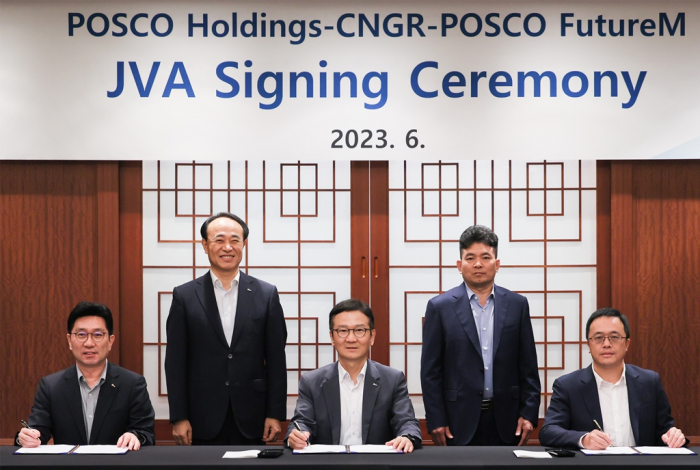Batteries
POSCO, CNGR to build $1.2 bn battery materials plants in Korea
They will produce 50,000 tons of nickel sulfate, 110,000 tons of battery precursors, enough for 1.2 million EVs
By Jun 21, 2023 (Gmt+09:00)
2
Min read
Most Read
Hankook Tire buys $1 bn Hanon Systems stake from Hahn & Co.


NPS to hike risky asset purchases under simplified allocation system


Osstem to buy BrazilŌĆÖs No. 3 dental implant maker Implacil


UAE to invest up to $1 bn in S.Korean ventures


US multifamily market challenges create investment opportunities



South KoreaŌĆÖs steel giant POSCO Group and ChinaŌĆÖs CNGR Advanced Material Co. have agreed to spend 1.5 trillion won ($1.2 billion) on secondary battery materials plants to meet increasing demand from the rapidly growing global electric vehicle industry.
POSCO Holdings Inc., the conglomerateŌĆÖs holding company, and POSCO Future M Co., the groupŌĆÖs battery ingredients manufacturer, on Wednesday inked a deal with CNGR, the worldŌĆÖs top lithium-ion battery cathode precursor maker, to set up joint ventures in Pohang. POSCO Future M is building a high-nickel cathode factory in the industrial port city, about 350 kilometers southeast of Seoul.
POSCO Holdings is set to establish a 6:4 nickel refining JV with CNGR, which will produce 50,000 tons of nickel sulfate a year, while POSCO Future M is poised to launch a separate 2:8 JV with the Chinese company, which will use the nickel sulfate to produce 110,000 tons of precursors annually. For those JVs, POSCO Group and CNGR reportedly decided to spend 750 billion won each.
They will start the construction of the plants during the fourth quarter with a target of mass production of the battery materials from 2026. The amount produced will be enough for 1.2 million EVs, according to POSCO Holdings.
POSCO Group and CNGR are likely to benefit from the cooperation as the US government requires that 50% of the value of battery components be produced or assembled in North America to qualify for an EV tax credit. It also requires that 40% of the value of critical minerals be sourced from the US or one of its free trade partners, such as South Korea, for the incentive.
Washington has yet to exclude battery materials produced by manufacturers in which Chinese companies have stakes from the tax break.
STABLE PRECURSOR PROCUREMENTS
POSCO Future M is expected to stably procure precursors, which account for up to 70% of cathode production costs, and improve its competitiveness through the partnership with CNGR. Local production meets only 13% of the countryŌĆÖs need for the materials.
ŌĆ£Through the joint ventures with global precursor leader CNGR we aim to establish a stable supply chain for the completion of the nickel-precursor-cathode material value chain and the improvement in synergy between businesses,ŌĆØ said Yoo Byeongog, POSCO Holdings senior executive vice president for the green materials and energy unit.
The holding company seeks to build a nickel smelting plant in Indonesia, the worldŌĆÖs top producer of the mineral. In 2021, the company acquired a 30% stake in Ravensthorpe Nickel Operation, an Australian nickel mining and smelting company, to secure the countryŌĆÖs nickel resources.
Last year, it broke ground for a high-purity nickel refining plant in South Korea with an annual capacity of 20,000 tons, enough for 500,000 EVs,┬Āto be completed later this year. The factory is set to use nickel resources from New Caledonia.
The group is building up its entire value chain to cover not only battery materials such as cathodes and anodes but also cell recycling.
Write to Jae-Fu Kim and Hyung-Kyu Kim at hu@hankyung.com
┬Ā
Jongwoo Cheon edited this article.
More to Read
-
 Corporate strategyPOSCO to comply with IRA rules to access battery tax breaks: chairman
Corporate strategyPOSCO to comply with IRA rules to access battery tax breaks: chairmanJun 01, 2023 (Gmt+09:00)
3 Min read -

-

Comment 0
LOG IN


